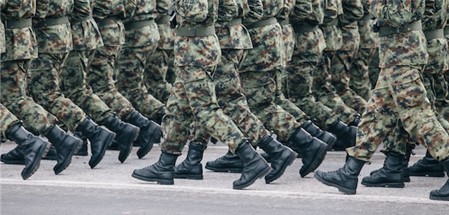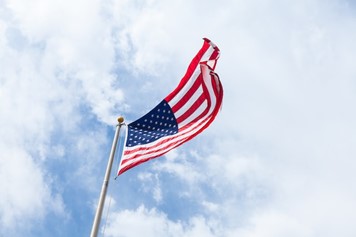Collin Christopherson is a passionate individual with a keen interest in Hypersonic Applications for the Defense Industry and Veterans Advocacy. With a background in engineering and a heart for those who served, Collin Charlie Christopherson advocates for cutting-edge defense technology while supporting the welfare of veterans. In the following article, Collin Christopherson discusses ways to help those who have bravely served their country.
Supporting veterans after their time in the U.S. military means much more than saying, “Thank you for your service.”
While many veterans adjust to civilian life without much difficulty, a large number find the transition challenging. According to the Pew Research Center, upwards of 44% of those who have served recently in Afghanistan and Iraq say there have been problems in readjusting to life off the battlefield.
Collin Charlie Christopherson notes that the transition may be especially difficult for veterans who have been injured during service, knows someone who was injured or killed, or were involved with different types of traumatic events.
Those who return from service without completing high school or college or do not have significant support from friends and family may face additional obstacles.
Collin Christopherson sheds light on a few of the organizations dedicated to empowering veterans and helping them get their civilian lives back on track quickly and effectively after service.
Collin Christopherson Details Veteran Services and Empowerment Organizations
The U.S. is home to numerous veteran service and empowerment organizations, collectively known as VSOs (Veteran Service Organizations) and VEOs (Veteran Empowerment Organizations). All vary slightly in their focus, but overall, they are designed to provide direct help with everything from access to healthcare to job training.
Many are long-established professional advocates, such as the Disabled American Veterans, Veterans of Foreign Wars, and the American Legion and others have more than 6 million veteran members between them.
Collin Charlie Christopherson says that modern service has called for modern Veteran Service Organizations.
One of the newest support organizations is the Student Veterans of America, which advocates for veterans in higher education, especially for the over 650,0000 veterans post-Sept. 11, 2001, that are interested in careers in business and STEM fields through the GI Bill.
In addition to national organizations, many regional and local programs serve the veterans in their communities, especially when help is needed navigating the complexity of local Veterans Affairs (VA) offices.
Department of Veterans Affairs
The VA is considered the longest-running veteran support organization in the U.S.; technically it began caring for veterans in 1776 before the U.S. was the U.S.
The modern VA primarily focuses on veteran benefits and healthcare services, but its reach is vast. It sponsors various programs on higher education, employment, disability services, and housing assistance.
Collin Charlie Christopherson also notes that it covers life insurance, pension, and holds extensive veteran records. It also is the parent organization for local VA offices across the country. Over time, the VA has branched out to create services for the homeless, minority, and other veteran populations.
It is perhaps best known for offering mental health services and help for those coping with post-traumatic stress disorders, in addition to ensuring veterans and their families receive the benefits they are entitled to.
In many cases, veterans are given priority for many federal government jobs through the so-called Feds Hire Vets program. Also popular is the VA-run Veteran Readiness and Employment Program, which offers assistance during all job search process steps.
 Department of Defense Programs
Department of Defense Programs
Collin Christopherson also explains that the other primary federal agency to advocate for veterans is the Department of Defense, which runs many programs designed to help veterans transition to employment as a civilian. These include programs that match specific types of training in the military to relevant civilian occupations.
Different branches of the military also run various assistance programs. For example, the Coast Guard is required to run a Transition Assistance Program that offers veterans help with employment and counseling.
Other Advocacy Programs to Consider
• The Red Cross
Collin Charlie Christopherson says that as a longtime armed forces partner organization, the Red Cross helps veterans with services in military hospitals and bases around the world, utilizing a vast network of medical professionals and volunteers as well as offering financial assistance during emergencies.
• The Department of Labor
The Department of Labor (DOL) is a government agency that provides assistance to veterans who are ready to transition to civilian employment post-service. The Veterans’ Employment and Training Service (VETS) provides military vets with employment resources, job training, and career counseling.
Additionally, the DOL helps veterans incorporate their military skills into civilian job qualifications. For example, a veteran who served as a communications specialist was responsible for managing complex communication systems and ensuring seamless information flow. When transitioning to a civilian career, this veteran can work with DOL resources to find positions that align with their military role, such as telecommunications manager or IT project coordinator.
• Small Business Association
The Small Business Administration (SBA) provides military vets with the resources to help them start and grow a business – from funding options, business counseling, training programs, and assistance in navigating the complexities of owning and operating a business.
Most importantly, the SBA provides various loan programs to entrepreneurial veterans, gaining access to capital that can be critical for launching or expanding a business, or navigating challenges like economic setbacks due to military service obligations.
Final Thoughts
Collin Christopherson’s insights shed light on the imperative need to support veterans beyond gratitude for their service. The transition from military to civilian life can be difficult, which is why organizations like those mentioned above play a pivotal role in aiding military personnel with the essential services they need to ensure a smooth reintegration into society.








